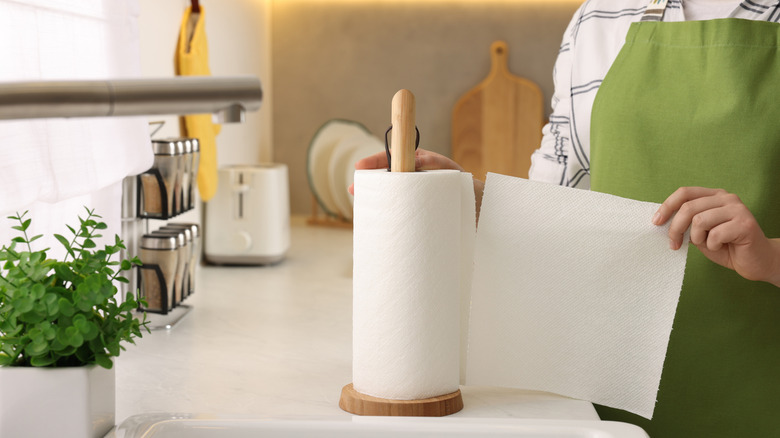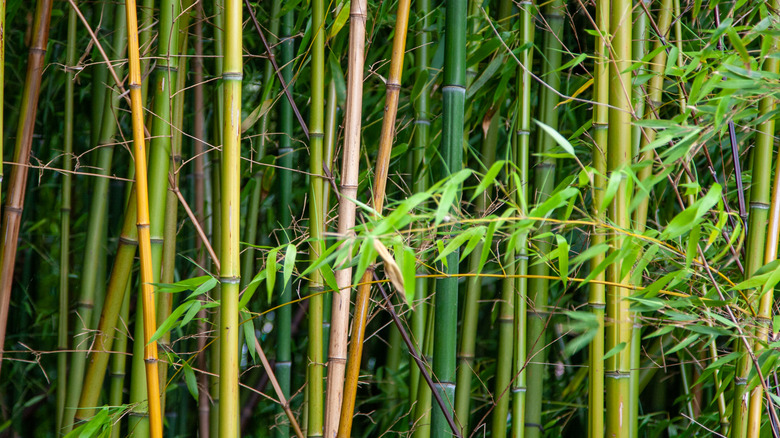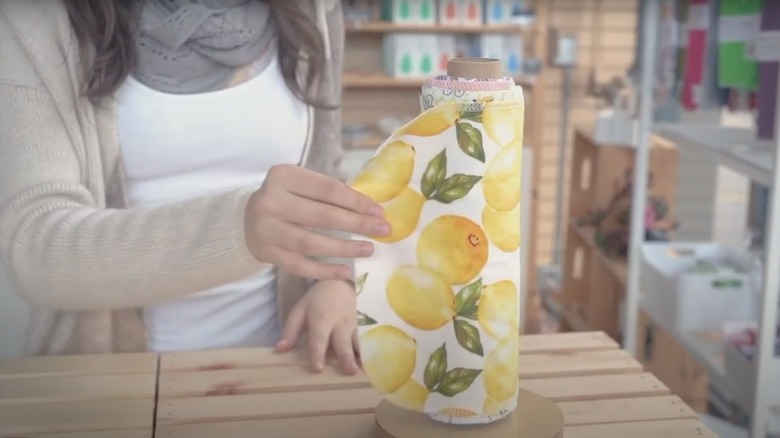Do Paper Towel Alternatives Really Reduce Waste & Help The Environment?
When unexpected spills happen throughout your home, the convenience of reaching for a few paper towels to mop up the mess can be hard to resist. Unlike regular dish towels, which can quickly harbor bacteria after a few uses, paper towels get discarded after each use, making them a bit more hygienic. However, that same single-use nature is what lands traditional paper towels in the landfill, making them wasteful and not very eco-friendly. Not to mention, the production of these paper towels relies on depleting natural resources and contributes to deforestation, leaving a horrible impact on the environment. With all of that in mind, looking for eco-friendly alternatives just makes sense. But are paper towel alternatives and reusable paper towels really worth buying or just a waste of money? In short — yes, they are worth buying. Finding the right paper towel alternative can help lower the environmental impact of production and reduce waste in the landfills.
There are all kinds of cost-effective paper towel alternatives to consider. You've probably seen brands like Marley's Monsters, which creates their UNpaper Towels from 100% cotton absorbent cloths. There are also tons of handmade options that come in a range of fun colors and patterns. If washable cloth isn't for you, there are also bamboo and recycled paper options that closely resemble traditional paper towels. But before you run to the store for paper towel replacements, there are a few factors to consider regarding their supposed environmental benefits.
Bamboo paper towels offer convenience and sustainability
For traditional paper towels, it takes roughly 17 trees to produce one ton of virgin paper. To put that into perspective, approximately 3,000 tons of paper towels are used each day in the US alone. Forests are often completely clear cut during the production process and although the trees can be replanted, the original forest and its unique ecosystem are gone forever. In addition to the trees cut for production, manufacturing paper towels also requires tens of thousands of gallons of water and results in harsh chemicals being introduced into waterways.
One alternative, bamboo paper towels like the ones produced at Caboo have far less of a negative impact on the environment. Bamboo has a fast-growing cycle and can regrow without people having to replant it. This means there is no need for clear-cutting large swaths of forests, making bamboo a far more sustainable and renewable resource. Additionally, there is much less of a need for chemicals such as fertilizer and pesticide in the production of bamboo paper towels, meaning this alternative is better for the earth and the waterways. Because bamboo paper towels are 100% biodegradable, many can be composted instead of stuffed into a landfill. Additionally, Shelley Vineyard, creator and lead for Natural Resources Defense Council's Issue with Tissue campaign, tells Home Planet, "Bamboo tissue products produce 30% fewer greenhouse gas emissions than those made from 100% virgin forest fiber."
Another option to consider is paper towels made from recycled paper. Recycled options are typically made from post-consumer recycled paper, which can include old newspapers and office waste. While these help reduce waste, they do require increased water usage to clean the recycled fibers and ink-removing chemicals that can have negative environmental impacts.
Washable cloth towels outlast traditional paper towels
You've probably heard of un-paper towels — both a brand and a general concept that focuses on using fabric cloths in place of traditional paper towels. On the surface, using cotton cloths is far more sustainable than single-use paper towels, as the cloths can be washed and reused again and again. In fact, with proper care, these cloths will stay in good, useable condition for up to 10 years. And while the water used for washing them is something to consider, if you throw the cloths in with a load of rags and towels you would need to wash anyway, it tends to balance out.
However, conventional cotton production in the US isn't especially eco-friendly, often requiring over 2,000 gallons of water for 2.2lbs of cotton. Cotton can also take longer to decompose once it's in the landfill — around 5 months compared to the estimated two-to-four weeks that traditional paper towels need. Keep in mind that this estimate doesn't factor in paper towels that are stuck inside trash bags, where they lack the oxygen and moisture needed for decomposition.
However, the slow decomposition of cotton cloths is offset by their long life cycle. For example, just one sheet of cotton paper towel can replace an estimated 22,000 traditional paper towels. Not to mention, most of these cotton cloths can be repurposed at the end of their life cycle, such as reusing worn out towels to make useful storage bags for your home. You can also use them as garage rags, ties, or stuffing for handmade stuffed animals or throw pillows. Overall, cotton alternatives still have a better impact on the environment and create less waste when compared to their paper counterpart, so it's certainly worth spending a little extra green upfront.


